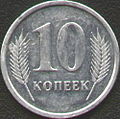Transnistrian ruble
 2007 issue Transnistrian ruble banknotes | |
| ISO 4217 | |
| Code | none |
| Unit | |
| Plural | рубле/ruble (Romanian) The language(s) of this currency belong(s) to the Slavic languages. There is more than one way to construct plural forms. |
| Symbol | |
| Denominations | |
| Subunit | |
| 1⁄100 | kopeck копейка (Russian) копеиcкэ/ copeică (Romanian) |
| Plural | |
| kopeck копейка (Russian) копеиcкэ/ copeică (Romanian) | kopecks копеичи/ copeici (Romanian) |
| Banknotes | |
| Freq. used | 1, 5, 10, 25, 50, 100 rubles |
| Rarely used | 200, 500 rubles |
| Coins | |
| Freq. used | 5, 10, 25, 50 kopecks, 1, 3, 5, 10 rubles |
| Rarely used | 1 kopeck |
| Demographics | |
| Date of introduction | 1994 |
| Replaced | Soviet ruble |
| User(s) | |
| Issuance | |
| Central bank | Transnistrian Republican Bank |
| Website | www |
| Mint | Tiraspol Mint (Тираспольский монетный двор) |
| Valuation | |
| Inflation | 10.83% |
| Source | "Inflation", Pridnestrovie, 2006 |
The Transnistrian ruble (alternatively rubla or rouble; Romanian: rublă transnistreană, Moldovan Cyrillic: рублэ транснистрянэ; Russian: приднестровский рубль; Ukrainian: придністровський рубль) is the currency of the internationally unrecognized state of Transnistria. It is divided into 100 kopecks.
Since Transnistria is a polity with no credible international recognition and its territory is formally part of Moldova, its currency has no ISO 4217 code, and thus Transnistria cannot participate in any global card payment processing network. Cards are accepted, but only on the Russian developed MIR network. However, unofficially some Transnistrian organisations, such as Agroprombank and Gazprombank, used the code PRB, a code reserved for Puerto Rico (ISO 3166-1 country code "PR"). The Transnistrian Republican Bank sometimes uses the code RUP,[1] a code reserved for Russia (ISO 3166-1 country code "RU").
First ruble (1994)
Soviet banknotes were used in the Pridnestrovian Moldavian Republic after its formation in 1990. When the former Soviet republics began issuing their own currencies, Transnistria was flooded with Soviet rubles. In an attempt to protect its financial system, in July 1993, the Transnistrian government bought used Goznak-printed Soviet and Russian notes dated 1961–1992 and modified these notes by applying adhesive stamps bearing the image of General Alexander Vasilyevich Suvorov, founder of Tiraspol, and the notes' corresponding denomination. These stamped notes replaced unstamped Soviet and Russian notes at par. It is thought that most uncirculated notes bearing these stickers were created after 1994 specifically for collectors.[2]
Second ruble (1994–2000)
The first, provisional issues were replaced in August 1994 by a new ruble, equal to 1,000 old rubles. This currency consisted solely of banknotes and suffered from high inflation, necessitating the issue of notes overstamped with higher denominations. Although issued in 1994, some notes (50 to 5,000 rubles) were issued dated 1993.
Banknotes
| 1994 Series | ||||||||
|---|---|---|---|---|---|---|---|---|
| Value | Dimensions | Main Colour | Images | Description | Date of | |||
| Obverse | Reverse | Obverse | Reverse | printing | issue | |||
| 1 ruble | 125 mm x 57 mm | Green | Alexander Suvorov | Transnistrian Supreme Soviet | 1994 | 1994 | ||
| 5 rubles | Blue | |||||||
| 10 rubles | Red | |||||||
| 50 rubles | Dull Green | Equestrian Statue of Alexander Suvorov in Tiraspol | 1993 | 1993 | ||||
| 100 rubles | Brown | 
| ||||||
| 200 rubles | Red violet | 1993 | 1994 | |||||
| 500 rubles | Blue | 1993 | 1994 | |||||
| 1,000 rubles | Purple and red-violet | 1993 | 1994 | |||||
| 1,000 rubles | Purple | Alexander Suvorov | 1994 | 1994 | ||||
| 5,000 rubles | Black on deep olive-green | Equestrian Statue of Alexander Suvorov in Tiraspol | 1993 | 1995 | ||||
| 10,000 rubles | Green | Alexander Suvorov overprinted on a 1 ruble note with "10000" only on front | 1994 | 1996 | ||||
| 10,000 rubles | Green | Alexander Suvorov overprinted on a 1 ruble note with "10000" on front and back | 1994 | 1998 | ||||
| 50,000 rubles | Brown | Bohdan Khmelnytsky | Drama and Comedy theatre, Tiraspol | 1995 | 1995 | |||
| 50,000 rubles | Blue | Alexander Suvorov overprinted on a 5 ruble note, with a holographic seal containing his equestrian statue in Tiraspol and the value "50000" on front | Transnistrian Supreme Soviet | 1994 | 1996 | |||
| 50,000 rubles | Blue | Alexander Suvorov overprinted on a 5 ruble note with "50000" on front and back | 1994 | 1996 | ||||
| 100,000 rubles | Red | Alexander Suvorov overprinted on a 10 ruble note with "100000" on front and back | 1994 | 1996 | ||||
| 500,000 rubles | Purple on yellow | Equestrian Statue of Alexander Suvorov in Tiraspol | 1997 | 1997 | ||||
Third ruble (2000–present)
In 2000, a new ruble was introduced at a rate of 1 new ruble = 1,000,000 second rubles. This new currency consists of both coins and banknotes.
Coins
| Coin of the Transnistrian ruble | ||||||||||
|---|---|---|---|---|---|---|---|---|---|---|
| Image | Value | Technical parameters | Description | Date of first minting | Notes | |||||
| Diameter | Thickness | Mass | Composition | Edge | Obverse | Reverse | ||||
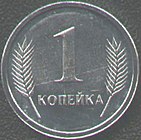
|
1 kopeck | 15.9 mm | 1.5 mm | 0.62 grams | Aluminum | Plain/Smooth | National emblem of the Pridnestrovian Moldavian Republic (Transnistria), year of issue | Numerical "1", inscription "КОПЕЙКА" between two ears of wheat | 2000 | Minted by the Mint of Poland (Mennica Polska); withdrawn from circulation in January 2009 |

|
5 kopecks | 17.9 mm | 1.4 mm | 0.7 grams | Aluminum | Plain/Smooth | National emblem of the Pridnestrovian Moldavian Republic (Transnistria), year of issue | Numerical "5", inscription "КОПЕЕК" between two ears of wheat | 2000 | Minted by the Mint of Poland (Mennica Polska) |
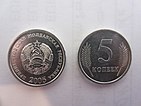
|
5 kopecks | 18 mm | 1.43 mm | 0.79 grams | Aluminum | Plain/Smooth | National emblem of the Pridnestrovian Moldavian Republic (Transnistria), year of issue | Numerical "5", inscription "КОПЕЕК" between two ears of wheat | 2005 | Modified coat of arms; minted by the Tiraspol Mint (Тираспольский монетный двор) |

|
5 kopecks | Nickel-plated steel | Plain/Smooth | National emblem of the Pridnestrovian Moldavian Republic (Transnistria), year of issue | Numerical "5", inscription "КОПЕЕК" between two ears of wheat | 2019 | Change of metallic composition; minted by the Tiraspol Mint (Тираспольский монетный двор) | |||

|
10 kopecks | 20 mm | 1.5 mm | 1 gram | Aluminum | Plain/Smooth | National emblem of the Pridnestrovian Moldavian Republic (Transnistria), year of issue | Numerical "10", inscription "КОПЕЕК" between two ears of wheat | 2000 | Minted by the Mint of Poland (Mennica Polska) |

|
10 kopecks | 20 mm | 1.5 mm | 1 gram | Aluminum | Plain/Smooth | National emblem of the Pridnestrovian Moldavian Republic (Transnistria), year of issue | Numerical "10", inscription "КОПЕЕК" between two ears of wheat | 2005 | Modified coat of arms; minted by the Tiraspol Mint (Тираспольский монетный двор) |

|
10 kopecks | Nickel-plated steel | Plain/Smooth | National emblem of the Pridnestrovian Moldavian Republic (Transnistria), year of issue | Numerical "10", inscription "КОПЕЕК" between two ears of wheat | 2019 | Change of metallic composition; minted by the Tiraspol Mint (Тираспольский монетный двор) | |||

|
25 kopecks | 17 mm | 2.15 grams | Aluminum-Bronze | Plain/Smooth | National emblem of the Pridnestrovian Moldavian Republic (Transnistria), year of issue | Numerical "25", inscription "КОПЕЕК" inside a stylized laurel wreath | 2002 | Minted by the Mint of Poland (Mennica Polska) | |

|
25 kopecks | 17 mm | 1.36 mm | 2.2 grams | Aluminum-Bronze | Plain/Smooth | National emblem of the Pridnestrovian Moldavian Republic (Transnistria), year of issue | Numerical "25", inscription "КОПЕЕК" inside a stylized laurel wreath | 2005 | Modified coat of arms; non-magnetic |

|
25 kopecks | 17 mm | 1.46 mm | 2.1 grams | Bronze-plated steel | Plain/Smooth | National emblem of the Pridnestrovian Moldavian Republic (Transnistria), year of issue | Numerical "25", inscription "КОПЕЕК" inside a stylized laurel wreath | 2005 | Modified coat of arms; magnetic; minted by the Tiraspol Mint (Тираспольский монетный двор) |

|
25 kopecks | Brass-plated steel | Plain/Smooth | National emblem of the Pridnestrovian Moldavian Republic (Transnistria), year of issue | Numerical "25", inscription "КОПЕЕК" inside a stylized laurel wreath | 2019 | Change of metallic composition; minted by the Tiraspol Mint (Тираспольский монетный двор) | |||

|
50 kopecks | 19 mm | 1.45 mm | 2.75 grams | Aluminum-Bronze | Plain/Smooth | National emblem of the Pridnestrovian Moldavian Republic (Transnistria), year of issue | Numerical "50", inscription "КОПЕЕК" inside a stylized laurel wreath | 2000 | Minted by the Mint of Poland (Mennica Polska) |

|
50 kopecks | 18.9 mm | 2.70 grams | Aluminum-Bronze | Plain/Smooth | National emblem of the Pridnestrovian Moldavian Republic (Transnistria), year of issue | Numerical "50", inscription "КОПЕЕК" inside a stylized laurel wreath | 2005 | Modified coat of arms; non-magnetic | |

|
50 kopecks | 19 mm | 1.45 mm | 2.80 grams | Bronze-plated steel | Plain/Smooth | National emblem of the Pridnestrovian Moldavian Republic (Transnistria), year of issue | Numerical "50", inscription "КОПЕЕК" inside a stylized laurel wreath | 2005 | Modified coat of arms; magnetic; minted at the Tiraspol Mint (Тираспольский монетный двор) |

|
50 kopecks | 19 mm | 1.45 mm | 2.80 grams | Bronze-plated steel | Plain/Smooth | National emblem of the Pridnestrovian Moldavian Republic (Transnistria), year of issue | Numerical "50", inscription "КОПЕЕК" inside a stylized laurel wreath | 2005 | Modified coat of arms; magnetic; minted at the Tiraspol Mint (Тираспольский монетный двор) |

|
50 kopecks | Brass-plated steel | Plain/Smooth | National emblem of the Pridnestrovian Moldavian Republic (Transnistria), year of issue | Numerical "50", inscription "КОПЕЕК" inside a stylized laurel wreath | 2019 | Change of metallic composition; minted at the Tiraspol Mint (Тираспольский монетный двор) | |||
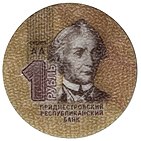
|
1 ruble | 26 mm | 1.2 mm | 0.85 grams | Plastic - Composite material[3] | Plain/Smooth | Numerical "1", inscription "РУБЛЬ, ПРИДНЕСТРОВСКИЙ РЕСПУБЛИКАНСКИЙ БАНК", portrait of Alexander Suvorov | Logo of the Transnistrian Republican Bank, year of issue and denomination in a repeated pattern | 2014 | Circular; Produced by Goznak of Russia |

|
3 rubles | 31 mm | 1.2 mm | 1 gram | Plastic - Composite material | Plain/Smooth | Numerical "3", inscription "РУБЛЯ, ПРИДНЕСТРОВСКИЙ РЕСПУБЛИКАНСКИЙ БАНК", portrait of François Sainte de Wollant | Logo of the Transnistrian Republican Bank, year of issue and denomination in a repeated pattern | 2014 | Square-shaped (with rounded corners); Produced by Goznak of Russia |

|
5 rubles | 28.6 mm | 1.20 mm | 1 gram | Plastic - Composite material | Plain/Smooth | Numerical "5", inscription "РУБЛЕЙ, ПРИДНЕСТРОВСКИЙ РЕСПУБЛИКАНСКИЙ БАНК", portrait of Pyotr Alexandrovich Rumyantsev-Zadunaisky | Logo of the Transnistrian Republican Bank, year of issue and denomination in a repeated pattern | 2014 | Pentagonal-shaped (with rounded corners); Produced by Goznak of Russia |
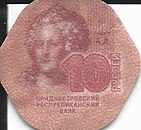
|
10 rubles | 28 mm | 1.2 mm | 0.9 grams | Plastic - Composite material | Plain/Smooth | Numerical "10", inscription "РУБЛЕЙ, ПРИДНЕСТРОВСКИЙ РЕСПУБЛИКАНСКИЙ БАНК", portrait of Catherine II, the Great | Logo of the Transnistrian Republican Bank, year of issue and denomination in a repeated pattern | 2014 | Hexagonal-shaped (with rounded corners); Produced by Goznak of Russia |
-
1 kopeck reverse
-
10 kopecks obverse
-
all 2000 coins
-
1 and 3 rubles (2015/2017), used for non-circulating commemorative coins
Coins are of 1 to 50 kopecks and are made from aluminium or copper-zinc and are similar to Soviet-era coinage. The 1 kopeck coins were withdrawn from circulation in January 2009.
On 22 August 2014, the Transnistrian Republican Bank issued coins made of composite materials and come in denominations of 1, 3, 5 and 10 rubles.[4]
Commemorative coins

Since 2000, the Transnistrian Republican Bank has issued many commercial commemorative coins made from silver and gold. Their mintage numbers were very low, ranging between 500 and 5,000. Topics included for example "Ancient fortresses on the river Dniester", "The outstanding people of Transdniestria" and "Red book of Transdniestria". A complete listing can be found on the website of the Transnistrian Republican Bank.[5]
Mint
When it was founded, Transnistria did not have its own mint, thus a foreign mint had to be found to strike Transnistrian coins. The Mint of Poland (Mennica Polska) in Warsaw was selected.[6] Coins dated 2000 were struck in Warsaw and transported via Ukraine to Transnistria in trucks belonging to the Transnistrian Republican Bank.
The Moldovan government was displeased with this situation, since they viewed it as a de facto recognition of Transnistria. In October 2001, Moldovan president Vladimir Voronin addressed the issue with his Polish counterpart.[7]
The Polska Mennica (Mint of Poland) responded to the criticism by stating that because the Transnistrian ruble is not internationally recognized as a currency, they were producing tokens and not coins, which is normal business for mints.[8]
The conflict came to a head when, in December 2004, Ukrainian customs confiscated a truck with US$117,000 worth of Transnistrian coins near Lviv. The coins were handed over to Moldovan authorities, who in response again protested with the Polish government.
The Polish Ministry of Foreign Affairs wrote another letter to Polska Mennica (Mint of Poland) in April 2005. They warned that continued production of Transnistrian coins would endanger relations with Ukraine and Moldova and damage the image of Poland abroad. The Polska Mennica (Mint of Poland) bowed to the pressure and cancelled its contract with Transnistria that same month.
For Transnistria there was then no other solution but to make future coins locally. Thus, on 18 November 2005, the Tiraspol Mint (Тираспольский монетный двор) was opened in the presence of President Igor Smirnov.
Banknotes
Notes are issued by the Transnistrian Republican Bank (Приднестровский Республиканский Банк) in 2000 as part of a currency reform, with 1 ruble equal to 1 million (1,000,000) old rubles. The notes come in denominations of 1, 5, 10, 25, 50, 100, 200 and 500 rubles.
2000 Series
| 2000 Series | ||||||||
|---|---|---|---|---|---|---|---|---|
| Value | Dimensions | Main Colour | Images | Description | Date of | |||
| Obverse | Reverse | Obverse | Reverse | printing | issue | |||
| 1 ruble | 129 × 56 mm | Orange | Alexander Suvorov | Chițcani monument | 2000 | 2000 | ||
| 5 rubles | Blue | KVINT brandy factory | ||||||
| 10 rubles | Brown | Novo-Nyametsky Monastery | ||||||
| 25 rubles | Red | Bender Castle | ||||||
| 50 rubles | 129 × 60 mm | Green | Taras Shevchenko | Presidential palace / government building in Tiraspol | ||||
| 100 rubles | Purple | Dimitrie Cantemir | The Cathedral of Christmas, Tiraspol | |||||
| 200 rubles | 135 × 64 mm | Dark brown | Peter Rumyantsev-Zadunaisky | Battle of Gross-Jägersdorf, July 21, 1757 | 2004 | 2004 2012 | ||
| 500 rubles | 140 × 68 mm | Dull green | Catherine II | The decree of the creation of Tiraspol by Catherine II, and the plan of a fortress[which?] | ||||
2007 Series
In 2007, a new series replaced the above banknotes of denominations 1 to 100 rubles. The new notes have the same themes but a new design and improved security features.
| 2007 Series | ||||||||
|---|---|---|---|---|---|---|---|---|
| Value | Dimensions | Main Colour | Images | Description | Date of | |||
| Obverse | Reverse | Obverse | Reverse | printing | issue | |||
| 1 ruble | 129 × 55 mm | Brown | Alexander Suvorov | Chițcani monument | 2007 | 2007 2012 | ||
| 5 rubles | Blue | KVINT brandy factory | ||||||
| 10 rubles | Green/Black | Novo-Nyametsky Monastery | ||||||
| 25 rubles | Red | Bender Castle | ||||||
| 50 rubles | 129 x 56 mm | Cyan | Taras Shevchenko | Presidential palace / government building in Tiraspol | ||||
| 100 rubles | Purple | Dimitrie Cantemir | Church of the Nativity, Tiraspol | |||||
Commemorative banknotes
Along with the issuance of banknotes for general circulation, the Transnistrian Republican Bank also issues commemorative banknotes focusing on the country's history and events relating to its development as an independent nation. The commemorative banknotes consist of an overprint applied on the note and are issued both for general circulation and also sold in limited numbers for the numismatic market.[9]
Exchange rates
The currency is de facto pegged to the United States dollar. The central bank determines each workday whether it is appropriate to devalue the currency against the US dollar.[citation needed]
As of 12 October 2024[10] (Transnistrian ruble per foreign currency unit)
- US dollar: 16.1000 rubles
- Euro: 17.6150 rubles
- Russian ruble: 0.1676 rubles
- Ukrainian hryvnia: 0.3907 rubles
- Moldovan leu: 0.8821 rubles
On 11 February 2009, the exchange rate was set to 9 Transnistrian rubles per dollar. It was changed to 9.40 rubles on 5 March 2010, 9.80 on 24 September 2010, and 10.20 on 14 December 2010. By 2013, the value of the ruble had dropped to 11.10 rubles per dollar. This was further changed to 11.30 per dollar on 16 March 2016. On 17 June 2017, the currency was devalued to 15 rubles per dollar. It was set to 16 per dollar on 12 January 2018. The most recent change was made on 5 April 2018, when it was set to 16.10 rubles per dollar.
Acceptance outside Transnistria
The Transnistrian ruble is generally not accepted as currency outside of Transnistria, although some bus companies with connections to Tiraspol accept the Transnistrian ruble at the Chișinău bus station as well as local shops in Varnița.[citation needed]
See also
References
- ^ Условия проведения операций "валютный своп" USD/RUP (in Russian), Transnistrian Republican Bank, retrieved 2011-09-21
- ^ Transnistrian Republican Bank. Available at:http://www.cbpmr.net/?id=33&lang=en
- ^ "Breakaway republic of Transnistria issues plastic coins Aug. 22".
- ^ Official poster of Transnistrian Republican Bank with images and description.
- ^ "Банк Приднестровья". www.cbpmr.net. Retrieved 2024-10-12.
- ^ "Polska Mennica bije monety dla Naddniestrza". 2005-01-13.
- ^ http://www.transnistria.info/independent-transnistria-news/tiraspol-designated-the-arrest-of-a-batch-of-the-transdniestrian-coins-as-a-provocation.html[permanent dead link]
- ^ http://www.mennica.com.pl/dla-inwestorow/sprawozdania-rn.html, sprawozdania Rady Nadzorczej Mennicy (2005).
- ^ "A gallery of the banknotes of Transnistria, including commemorative banknotes". www.banknote.ws. Bank Note Museum. Retrieved 2020-12-07.
- ^ "News". www.cbpmr.net.
External links
- Pridnestrovie's own currency
- Central Bank of PMR (official website)
- Banknotes of Transnistria (Detailed Catalog)
- Coins of Transnistria at CISCoins.net
- The banknotes of Transnistria (in English, German, and French)
- "Proposal to Encode a Pridnestrovian Ruble Sign in the Unicode Standard" (PDF). Unicode.


